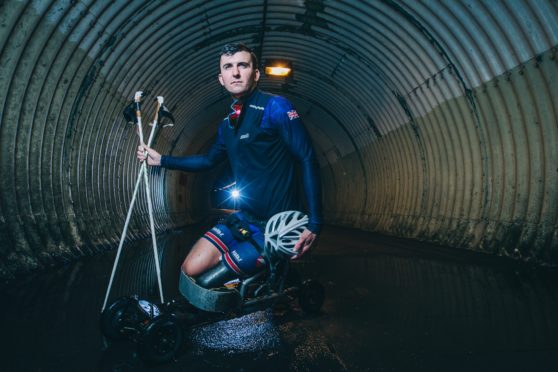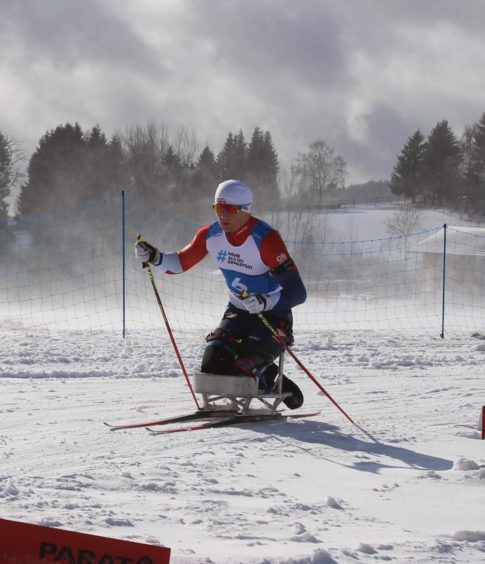
Having survived a near-fatal motorcycle crash, Callum Deboys was not going to let a global pandemic slow him down.
Determined to represent Team GB at the Beijing 2022 Paralympic Winter Games, the 24-year-old para Nordic sit-skier has continued to train throughout lockdown.
Callum, from Kirkmichael in South Ayrshire, took up the high-speed sport in 2018, just one year after he woke from a coma to learn he had lost his left leg after his devastating accident.
Unable to train at the Emirates Arena in Glasgow or compete in cross-country and biathlon events, Callum has swapped the mountains of Northern Europe for the streets around Ayrshire.
Rain or shine, he continues to train on an adapted sled to keep his body race-ready and his times in line with the world’s best.
“It’s a shame to have missed out on the rest of this season but training has at least kept me busy during lockdown,” said Callum. “I attached my snow seat to a mountain board, a skateboard with big wheels, and have been practising around Ayrshire as the roads have been so quiet. People look a bit bewildered when I pass them but are interested in what I’m doing.”
Sit-skiing has already taken Callum around the world to compete in Canada, Norway, Sweden, Germany and Austria, after he quickly rose to 15th in the world for biathlon and 27th for cross-country.
A meteoric rise into the world of parasports is something Callum could never have imagined before the accident that changed his life three years ago. He had been travelling on his motorbike to the Trump Turnberry resort, where he worked as a pastry chef, when he suddenly had to swerve to avoid an oncoming car.
“I high-sided my bike, got flipped up and landed on my feet. The impact broke both my legs, my pelvis, two vertebrae, two ribs, punctured a lung and ruptured my diaphragm,” said Callum, who was 21 at the time. “It was a broken femur that cut my femoral artery, which meant my left leg had to be amputated. I was sedated by the roadside and airlifted to hospital, where I was rushed into theatre for over 20 hours of surgery. When it comes around, I say it’s my Happy Death Day because I should have died that day.”
Callum woke from an induced coma three weeks later with no memory of the crash to learn that, while lucky to be alive, he was now an amputee.
“It was a total shock. I took me a few days to come to terms with what had happened and I did feel low at times,” he said. “During the month I spent in hospital recovering and learning to walk on my first prosthetic leg, I realised that this was a good opportunity to change my life and my mindset. Since the accident I’ve tried to take opportunities to challenge myself and do things I never thought were possible.” Callum credits sport for his miraculous recovery. During his six-month rehabilitation, he took up rowing to help strengthen his core post-surgery. Meeting Scottish Paralympic sit-skier, Scott Meenagh, at the WestMARC rehabilitation centre in Glasgow, set him on a path to the Winter Paralympics.
“About one year after my accident, Scott invited me to try para Nordic sit-skiing with the Armed Forces para-snowsport team at a training camp in Germany,” he explained. “We started in an underground snow tunnel. It felt amazing to be on the skis. Going that fast again gave me that same adrenaline rush that I missed from being on my motorbike.
“The first time I skied outside was in Trysil, Norway. It was the best experience because everything is so open and you feel like you are going so much faster. I fell in love with the sport after that and went to my first competition in Finland five months later. In my second race, I achieved 178 points. That’s a world qualifying time for the Paralympics, which requires you to score under 180 points in a World Championship race.
“It gives me purpose and a reason to get out of bed in the morning.”
The talented para-athlete joined his friend and mentor Scott in the five-strong Team GB para Nordic squad in 2018, following his first World Championships in Prince George, Canada, where he placed 13th in cross-country.
Para Nordic skiing debuted at the Winter Olympics in 1976 and consists of two disciplines: cross-country skiing and biathlon. Until 2018, Great Britain had not competed at Paralympic level since 1998.
Callum explained: “We use a rig, like a seat, which is specifically adapted to a person’s disability and is set on two skis. We use ski poles to propel ourselves along, using our core and arms for power.
“We race cross-country over hilly terrain, from a 1.5 kilometre sprint to 15km, reaching speeds of 20-40km per hour. For biathlon, we race and stop to shoot at five targets, which are 10 metres away and roughly the size of a five pence piece.”
In a disappointing end to his current season, the para Nordic skiing World Championships in March were cancelled due to the coronavirus crisis.
While the global pandemic has led to the postponement of the 2020 Tokyo Olympics until next July and August, it has yet to affect Paralympic hopefuls.
The Covid-19 lockdown has also encouraged Callum to focus on his mental health. “I’ve stayed positive for the most part but everyone has their ups and downs. I had suffered from anxiety and depression in the past and the crash did bring some of that back,” revealed Callum.
“During the last few months, I’ve started counselling sessions over the phone. I realised speaking to someone would help me unravel the accident in my head and help me stay positive.”
Callum’s incredible determination, optimism and achievements have seen him become an ambassador for the Paisley-based amputee charity, Finding Your Feet. “I love the charity because it’s shown me there is so much I can still do, like climbing and go-karting,” he said.
And now, after a whirlwind three years, the sportsman has his sights firmly set on Beijing.
“Getting to the Winter Olympics is the No 1 goal. The test event in China is confirmed to go ahead in March next year. I feel confident I will qualify. Team GB require under 100 points and I’ve done that before. That’s my main ambition, as well as staying fit, happy and healthy. I want to keep challenging myself.”
Callum’s mum, Bridget, and dad, Richard, have supported him throughout his training. “I just need to keep training and get to the Beijing Games so they can come along with me,” he added.
“Discovering para skiing has already changed my life and taken me to places I’d never dream of visiting. It keeps my life exciting. It sounds bizarre but my accident is one of the best things that has ever happened to me.”

Enjoy the convenience of having The Sunday Post delivered as a digital ePaper straight to your smartphone, tablet or computer.
Subscribe for only £5.49 a month and enjoy all the benefits of the printed paper as a digital replica.
Subscribe
